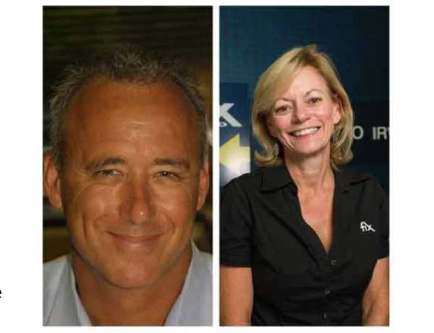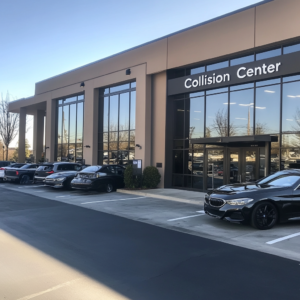This article was written by Stacey Phillips and published by Automotive News on July 11, 2020. Here is the link to the article.
When industry veteran Erick Bickett was growing up, he aspired to be an airline pilot like his dad. He realized that a 9-to-5 job wasn’t for him.
Erick always had an interest in cars and eventually opened a body shop with his partner, Shelly Bickett, who had a background in accounting.
That was more than 35 years ago. Since then, Erick and Shelly have founded a number of organizations in the collision repair industry. These include Caliber Collision, the Collision Industry Electronic Commerce Association (CIECA), Cyncast, Fix Auto USA and the Collision Career Institute (CCI), which supports industry apprenticeships.
Autobody News recently talked to Erick and Shelly about their career highlights as well as advice to shops on how to be successful in the future in light of COVID-19 and industry changes.
How did you both get started in the collision repair industry?
Erick: While in college, I took a job driving a tow truck. I eventually managed the tow company and then transferred to the owner’s body shop. Later, I managed a dealer group. I also obtained my license to become an insurance agent.
Early on, I realized I could be competitive in the body shop business. Shelly was a big influencer in that decision. I was 28 years old when she convinced me to go out on my own. In 1984, we invested in a body shop owned by a couple of dealerships in Anaheim, CA, and eventually purchased the business, Auto Center Auto Body Inc.
We operated out of a 3,500-square-foot facility behind a used car lot. Three years later, we built a 30,000-square-foot state-of-the-art location at an auto mall where there were a number of dealers in one location. The business eventually became part of Fix Auto USA and grew to include 165 employees at nine locations, spanning over 200,000 square feet and bringing in more than $30 million in annual gross revenues.
Shelly: I never intended to be in the body shop business. I went to school for accounting and was working at New York Life Insurance. When we bought into the business, I started doing the accounting part time. Eventually, I worked there full time when we purchased the company.
At the time, most body shop managers and owners had grown up in the business and didn’t have financial or accounting experience. Erick is a great businessman and his financial expertise helped us a lot and set us apart from our competitors.
How did your involvement in 20 Groups eventually lead to the formation of Caliber Collision?
Shelly: When we started our first business, we became involved in a 20 Group with other like-minded individuals. We’ve always found the networking to be very beneficial and it’s a great way to share knowledge and best practices. It also gives you the ability to have a bigger footprint to work with insurance companies. Otherwise, your body shop is like a lone ship on the ocean.
The shop owners would measure themselves against themselves, and we soon realized that we needed to compare ourselves with other shops nationwide. These measurements and numbers are now called Key Performance Indicators (KPIs.)
Erick: The formation of the 20 Group started with a group of California shops coming together to talk about the challenges of software we were all using. At that meeting, we realized the benefit of having discussions about business development issues and this led to the formation of our 20 Group.
The industry was going through a lot of change and having the association of great operators was really important. When you are all by yourself, you’re not exposed to different viewpoints and other ways of doing things. Through the 20 Group process, we learned that the best form of continuous improvement is posting results and comparing them among the group.
We were all active nationally at that time and a group of six business owners decided to form Caliber Collision in 1991.
What role have you played in creating technology for the industry?
Erick: It was that learning through the 20 Group that was an incentive to eventually start CynCast in 2000, a technology company serving thousands of collision repair shops that was later sold to Enterprise Rent-A-Car. We built technology predominantly to create transparency around shop performance. In a 20 Group, that’s fairly easy to do because everyone brings in their financials in a common format.
Since there wasn’t anything already built for the industry in the late 1990s, we started the Collision Industry Electronic Commerce Association (CIECA), the only industry organization providing standard methods of electronic commerce. Having e-commerce is critically important. The way things are going now with APIs (application program interfaces), and how software components and computers interact, it’s all becoming more integrated, leading to efficiencies for the industry.
At Cyncast, we built the first Estimate Management Standard (EMS) data pump. EMS was created through CIECA and we used this standard to build the first EMS pump, replicating all information automatically from remote estimating systems.
In the 1990s, we created the first Customer Satisfaction Index (CSI) system in the Collision Repair Management System (CRMS) so shops could share data. We also built many web-based claims tools to be used by shops.
Shelly: Another concern for shops is the technology in vehicles today. Vehicles may have technical changes from one year to the next. Technicians may think they know how to repair them, but it’s essential they look up and be well-versed in OEM procedures.
What led you to open Fix Auto USA and what was the mission?
Shelly: When we sold Caliber in the mid-1990s, Erick went to Canada and purchased the U.S. rights to Fix Auto in 1997.
Erick will probably tell you we were early to market as far as franchising goes. There wasn’t much competition. Now, it’s a whole different world.
I call the independent shop owners and entrepreneurs out there, “the heart and soul of America.” They work hard and always find ways to take care of employees and customers. Supporting those types of independent shop owners and helping them grow was what Fix Auto has always been about.
Erick: We started Fix Auto because we wanted to stay independent while ensuring we protected the ability to extract equity and value when it was time to retire. I recall giving what I called the “brass ring presentation” to a group of 17 brave collision shops in Anaheim that became the first franchises to join Fix Auto USA.
In my presentation, I explained that businesses have value because of the customers that patronize them. If you want to retire someday and extract the value from your business, you must maintain this goodwill. It was about supporting independent shops that wanted to survive while protecting their equity and value. Over the years, the franchise network grew to include 150 locations in 10 states.
What prompted the sale of ACAB Automotive Group and Fix Auto USA?
Shelly: As we all know, we’re in an extremely consolidating market. We wanted to help Fix Auto grow, so about a year and a half ago, we began looking for investors.
Erick: We felt the timing was right. When Driven Brands came along, we got a feel for their culture and quickly realized they were a perfect fit. Trying to get a transaction like this done in the middle of COVID-19 was very difficult. However, it’s proven to be a phenomenal relationship.
What role did David Roberts of Focus Advisors play in the transaction?
Erick: I’ve known David Roberts for a long time. He and Matthew Ornstein bought into Caliber in the mid-1990s. It was an obvious choice to reach out to David when we were looking for an investment banker to lead the transaction. Everything we’ve done relative to this transaction has gone very well. David has been fantastic throughout the entire process while putting the deal together. With his knowledge and expertise, he completely understands how an entrepreneur thinks and I can’t say enough about the experience with him and the resources he brings to the table.
Shelly: He knows the industry really well, so that was a huge advantage. The business we built is like having a baby; you want to see it succeed in the future. There are so many people to consider in a transaction like this and it was important for us to pick the correct group. David always listened to us to see what we wanted.
What are your plans now that you sold your body shops and Fix Auto USA?
Shelly: What has been nice is that Driven Brands is keeping us involved with the business. We didn’t just walk away on April 20.
Erick: The situation is ideal. We are still actively involved in the organization and supporting the transition. A lot of our employees have been with us for a long time and our goal is to make it as smooth of a transition as possible.
What are some of the challenges and growth opportunities in the industry?
Erick: Entrepreneurs are very proud, and at the same time, they are stubborn. In the late ’80s and early ’90s, we watched the transition from adjusted claims to DRPs. At that time, there were highly respected industry leaders who dug in their heels, telling other shop owners not to participate in a DRP. We, on the other hand, saw the value and opportunity and leveraged significant growth from these new relationships. Early on, we worked with insurers to help develop their DRP programs.
I’m finding that a similar situation is happening right now in regard to OEM certifications. We’ve been talking about OEM certifications within our Fix Auto franchise network, and we strongly feel that shops have to be certified. At the same time, we see people digging their heels in, even at our own shops asking, “What is the ROI?”
Shelly and I decided to move ahead with certification, knowing that it would pay off in the future. Some shop owners don’t think it’s important to be certified with all makes and models of vehicles, but what they don’t understand is that the first level of change will be filters on First Notice of Loss (FNOL.) As an example, that means if you aren’t certified with Nissan, you aren’t going to be repairing Nissans.
Shelly: Vehicle technology is advancing rapidly. First and foremost, we need to repair cars correctly according to OEM procedures and ensure we put people back in a safe vehicle. I hope and pray for and believe that OEMs, insurers and body shops will be completely aligned in the correct repairs of vehicles. We’re starting to see that now with insurers directing work to those shops that have OEM certifications; that’s a great thing.
What are some of the effects of COVID-19 on the collision repair industry?
Shelly: I think reacting quickly to COVID-19 and making changes was really important. However, I think we’ll see shops go out of business, whether that’s consolidators deciding to close locations or independents who can’t make it through. Even if they reacted quickly, we’re going through something very significant. In a very short period of time, some shop owners have lost 50% of their business in weeks.
Erick: I think it’s all about how shops respond when coming back to the new market. No doubt, it’s going to be very different than what we experienced before.
As a result of the pandemic, we took out the duplication in our business and created efficiencies, but unfortunately, we had to lay off 55% of staff. We learned how to do things differently out of necessity and shame on us if we don’t come back differently and go back to doing things the same way. Smart operators are going to take what they’ve learned from this situation and develop a different structure for their businesses. Those who don’t adjust to the business climate are not going to be competitive.
What do you think the future holds for collision repairers?
Erick: One of the things that our experiences have resulted in is that we’ve been able to predict what’s going to happen. We are going through more dramatic change, danger and opportunity than ever seen in our industry before.
I think the future of the entrepreneurial collision shop is going to be dictated by how repairers respond to the changes coming. Independent collision shops owners add a ton of value and can survive if they work together and take the necessary actions to respond to market needs. At the same time, they need to remain competitive and look for efficiencies while removing duplication and waste in their businesses. If independent shops don’t do these things, they’ll likely become extinct.





